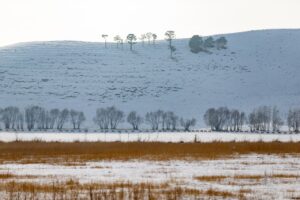GHAZNI CITY (SW) – Agricultural experts in Ghazni say that due to climate changes, soil erosion in this province has accelerated.
Hashmatullah Sayes, a university professor in Ghazni, states that the consequences of climate change have affected many farmers in the province. He adds: “When the temperature rises, the water present on the soil surface evaporates, and the plants on the soil surface dry out. Once the plants dry out, the seasonal and non-seasonal winds, along with the “O” and “A” horizons on the soil surface, destroy them.”
Saleh Mohammad Ghaznawi, another agricultural expert, says the excessive use of bushes and animal manure by farmers has reduced the land’s resistance to climate changes. He said: “A large portion of Ghazni’s soil is alkaline and has a high pH; it is the poorest in terms of organic material. This is because farmers burn animal manure and plant organic materials for heating homes and cooking, rather than using them in agricultural fields. They also cut bushes and trees, which leads to soil becoming barren.”
These agricultural experts add that protecting bushes, digging trenches, creating green walls, educating farmers, planting resistant crops, and increasing plant cover can help reduce soil vulnerability to climate changes.
Hashmatullah Sayes said: “Floods should be prevented; the use of organic material improves the soil structure, and water is better absorbed into the land. Windbreaks should be created in areas where strong winds exist, and green walls should be used to prevent soil erosion.”
Saleh Mohammad Ghaznawi also adds: “Planting resistant crops is one of the solutions to fight climate change. Through this, we can strengthen plants and increase plant cover.”
However, Zakaria Hotak, the Director General of Plant Protection at the Agriculture, Irrigation, and Livestock Directorate of Ghazni, says that introducing plants for ground cover, establishing support networks, and creating green belts are important programs by this department to fight the consequences of climate change.
“We aim to provide technical and expert advice to farmers; preventing soil erosion, introducing plants for soil cover, establishing irrigation systems, planting trees, creating green belts to prevent soil erosion, and launching educational programs are part of this department’s efforts,” he added.
Climate change has had negative effects on various aspects of Afghan citizens’ lives, particularly on the agricultural system. To fight it, long-term programs are needed.






